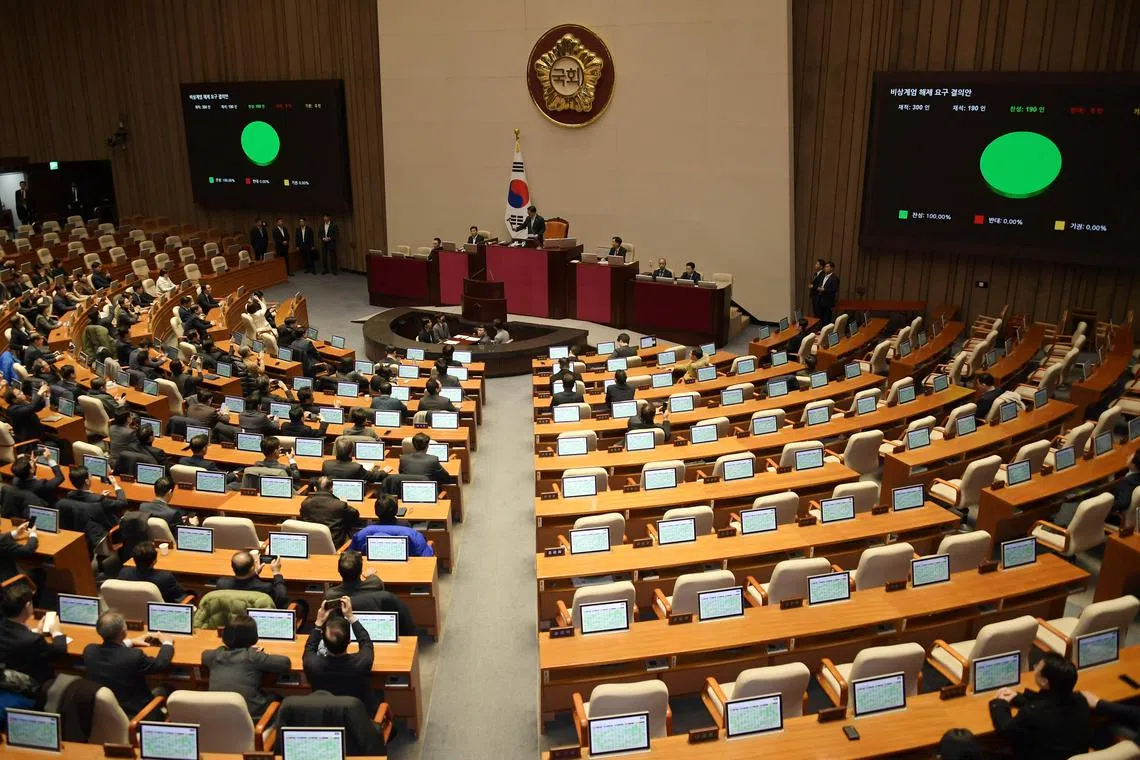S. Korea’s spy chief denies Yoon ordered arrest of politicians during martial law
Sign up now: Get insights on Asia's fast-moving developments

South Korea's National Assembly Speaker Woo Won-shik (centre, top) passes a resolution demanding the immediate lifting of martial law on Dec 4.
PHOTO: AFP
Follow topic:
SEOUL - Mr Cho Tae-yong, the director of South Korea’s National Intelligence Service (NIS), said President Yoon Suk Yeol did not give the spy agency any orders about arresting politicians.
Mr Cho denied claims raised by Mr Hong Jang-won, the NIS deputy director, who said the president told him to arrest politicians.
“I would like to make it very clear that the president has not asked the NIS director to arrest politicians. The president has not given orders for an arrest before or after the martial law declaration,” Mr Cho told reporters on Dec 6.
“The NIS does not have investigative authorities, and as such it is not capable of carrying out arrest orders,” he said. “The NIS was not involved at all.”
Mr Cho claimed that in his conversation with Mr Hong earlier, the deputy director also denied having received such orders from the president.
“Even if the president were to communicate such things with the NIS, it would have been communicated to the director, not the deputy director,” Mr Cho said.
Mr Hong on Dec 6 told the National Assembly that he had been ordered to take into custody six top political leaders: Ruling People Power Party chair Han Dong-hoon, main opposition Democratic Party of Korea chair Representative Lee Jae-myung, Democratic Party of Korea floor leader Park Chan-dae, minor opposition Rebuilding Korea Party chair Representative Cho Kuk, Representative Jung Chung-rae of the Democratic Party and National Assembly Speaker Woo Won-shik.
Mr Yoon also ordered Mr Hong to assist the Defence Counterintelligence Command in detaining the aforementioned individuals, along with former Supreme Court Chief Justice Kim Myeong-soo and liberal journalist Kim Ou-joon, according to a media briefing made by Representative Kim Byung-kee of the main opposition party on the afternoon of Dec 6.
Mr Hong’s testimony confirmed earlier media reports that the president had planned to arrest all his prominent political rivals.
But he refused to take such orders, to which Mr Yoon reportedly responded by ordering him to be dismissed for insubordination. He reportedly tendered his resignation earlier on Dec 6.
Mr Cho said he asked earlier on Dec 6 that the president replace Mr Hong as deputy director as he “violated the principle of maintaining political neutrality”.
According to Mr Kim, who was briefed by Mr Hong on Dec 6, however, the NIS deputy director said Mr Yoon told him to “arrest them (politicians) all” in a phone call after the president declared martial law.
As proof, Mr Hong showed Mr Kim and other lawmakers a log of phone calls that took place between him and the president on the night of martial law
The presidential office told reporters at around 1.30pm that Mr Yoon had not ordered any lawmaker to be arrested, but the office then told them to disregard this statement just minutes after the announcement was made for unspecified reasons.
South Korea’s Martial Law Act states in Article 13 that lawmakers have immunity against being arrested or detained, except in cases where they are caught in a criminal act. THE KOREA HERALD/ASIA NEWS NETWORK

